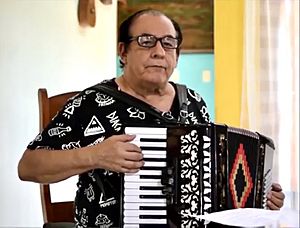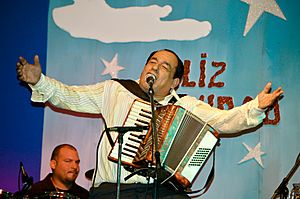Carlos Mejía Godoy facts for kids
Carlos Mejía Godoy (born June 27, 1943) is a famous Nicaraguan musician, composer, and singer. He is known for his "new song" style, which often tells stories and shares important messages.
Carlos grew up in a family that loved music and traditional culture. This helped him connect with the artistic world of Nicaragua from a young age. He became good friends with other musicians like Pedro Miranda and Silvio Linarte.
Carlos and his brother, Luis Enrique, were very important in the nueva canción (new song) movement in Central America during the 1970s. Both brothers received Nicaragua's highest cultural award, the Order of Rubén Darío.
Carlos Mejía Godoy was also involved in the Sandinista Revolution. He wrote many songs that supported the fight against the government of Anastasio Somoza Debayle. These songs helped share the message of the revolution around the world. After the revolution succeeded, he continued to promote culture for the new government. Later, he became less involved with the Sandinista party and its leader, Daniel Ortega. He even took part in the protests in 2018.
Contents
Early Life and Musical Start
Carlos Mejía Godoy was born in Somoto, Madriz on June 27, 1943. His father, Carlos Mejía Fajardo, was a popular musician, and his mother, María Elsa Godoy, was a teacher. His younger brother, Luis Enrique Mejía Godoy, is also a well-known Nicaraguan musician.
In 1954, Carlos left his hometown to continue his studies. In the 1960s, he started university and began working in radio. He was a radio host, actor, and writer. His work in radio continued into the 1970s, where he became known for creating funny radio shows that made people think. It was during this time that he started writing his first songs.
One of his early popular works was "Alforja Campesina," performed by the group "Los Madrigales." Carlos also worked with the trio "Los Bisturices Armónicos" to study and share old peasant songs from Nicaragua. During these years, he wrote songs with social messages, showing his support for the Sandinista National Liberation Front and the student movement. Some of these songs include "Yo no puedo callar" (I Cannot Be Silent) and "Muchacha del F.S.L.N." (Girl of the F.S.L.N.).
In the late 1960s, while working at Radio Corporación in Managua, he created a character called "Corporito." This character helped him realize his talent for communicating with people through music and humor. He would sing a parody every day, changing the words of well-known songs to talk about political and social issues.
After the earthquake in 1972, Carlos helped create the "Taller de Sonido Popular" (Workshop of Popular Sound) with other musicians. He also joined the group "Gradas." As part of the "National Song Salvation Brigade," he helped save and share many traditional Nicaraguan folk songs.
Music and Famous Songs
Many of Carlos Mejía Godoy's songs, performed with his band los de Palacagüina, became very popular. They were often heard as songs of workers and people who wanted change. He even composed a special Mass for working people called the Misa Campesina Nicaragüense (Nicaraguan Peasant Mass).
One of his biggest achievements happened in 1977. His song Quincho Barrilete (Quincho, the Boy of the Little Barrel), sung by Eduardo Gonzalez, won the sixth edition of the OTI Festival. This victory is still remembered by many Nicaraguans today.
In 1980, Carlos Mejía Godoy and los de Palancagüina were chosen to represent Nicaragua in the OTI Festival. Their song was La chavalita de España (The Little Girl from Spain). This marked Nicaragua's return to the event after two years away due to the Nicaraguan Revolution. Their song was a favorite and finished in tenth place.
Carlos Mejía Godoy also became involved in politics. In 2006, he ran for vice-president with Edmundo Jarquín in the presidential election. They finished in fourth place.
In 2021, Carlos Mejía Godoy spoke out against a proposed law that would declare songs of the Nicaraguan National Guard as national heritage. He felt this law could unfairly affect his own musical works.
Awards and Recognitions
| Year | Award | |
|---|---|---|
| 2016 | Latin Grammy Trustee Award | |
| Order of Ruben Dario Award | ||
| 1977 | OTI Festival Winner |
Family and Personal Life
Carlos Mejía Godoy has several children who are also talented musicians. His son, Camilo Mejía, is an author and activist. His other sons, Carlos Luis 'La Bujilla' Mejía and Augusto 'El Negro' Mejía, are part of the Grammy-nominated Nicaraguan band La Cuneta Son Machín.
Carlos Mejía Godoy is married to Xochitl Jimenez. He has been a strong voice for change in Nicaragua. From 2018 to 2020, he lived in Costa Rica. Since 2020, he has been living in Santa Rosa, California.
Discography
- Albums
Some of his albums include: El Son Nuestro De Cada Día (Our Daily Sound), La Nueva Milpa (The New Cornfield), Grandes Éxitos (Greatest Hits), and A Dos Puyas, No Hay Toro Valiente (With Two Spears, There's No Brave Bull).
- Contributing Artist
His music has been featured on several collections of songs about Nicaragua and the Nicaraguan revolution. These include Songs of the Nicaraguan Revolution, Vol.1-2 and Nicaraguita: Music from Nicaragua. He was also featured in The Rough Guide to the Music of Central America (2002). Mejía Godoy was featured on the title track from La Cuneta Son Machín's Cañambuco (2017).
The band Jefferson Starship recorded one of his songs for their 2008 album Jefferson's Tree of Liberty.
See also
 In Spanish: Carlos Mejía Godoy para niños
In Spanish: Carlos Mejía Godoy para niños
 | James Van Der Zee |
 | Alma Thomas |
 | Ellis Wilson |
 | Margaret Taylor-Burroughs |



